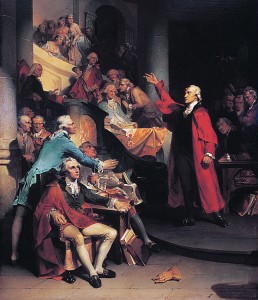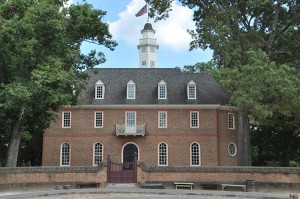House of Burgesses 400
July 29, 2019
On July 30, 1619, 400 years ago tomorrow, the House of Burgesses met for the first time in Jamestown, the first capital of the English colony of Virginia. The House of Burgesses was the first representative legislative body in colonial America. Governor Sir George Yeardley called the meeting in the choir of the Jamestown Church. The session included two citizens, or burgesses, from each of the 11 boroughs (subdivisions) of Virginia. They discussed such topics as land ownership, taxes, rules for personal conduct, and relations with the local Powhatan Native Americans. An oppressive heatwave cut short the first session on Aug. 4, 1619, but the House later met with the governor and his council to make laws for the colony. This combined lawmaking group was known as the General Assembly. It continues today as the legislative body of the state of Virginia.

The Virginia statesman Patrick Henry argues before the House of Burgesses in 1765. The House met for the first time 400 years ago on July 30, 1619. Credit: Detail of Patrick Henry Before the Virginia House of Burgesses(1851), an oil painting on canvas by Peter Frederick Rothermel (Patrick Henry Memorial Foundation)
In Virginia, 400th anniversary events will take place at Jamestown—themed “Origins of American Democracy”—and at Williamsburg, where the House of Burgesses was reestablished after the city became the colony’s new capital in 1699. The Williamsburg building that hosted the House of Burgesses still stands, and current members of the General Assembly will convene a special session there tomorrow, July 30. Richmond, the state of Virginia’s capital since 1780, is also hosting events to commemorate the first meeting of the House of Burgesses.
The first act of the House of Burgesses was to approve an official great seal for the Virginia colony. The House also claimed the right to act on all tax laws. In 1621, the House received the authority to make all legislation, but the governor and his council had the right of veto. The House conformed to English law and used the same procedure as the English Parliament.
The House of Burgesses was not completely democratic. But it contributed to the development of representative government in colonial America. When it was temporarily dissolved in 1774, its members met in the first revolutionary convention of Virginia. There they elected delegates to the First Continental Congress. Such members of the House of Burgesses as Patrick Henry and George Washington became important figures during the American Revolution (1775-1783).



